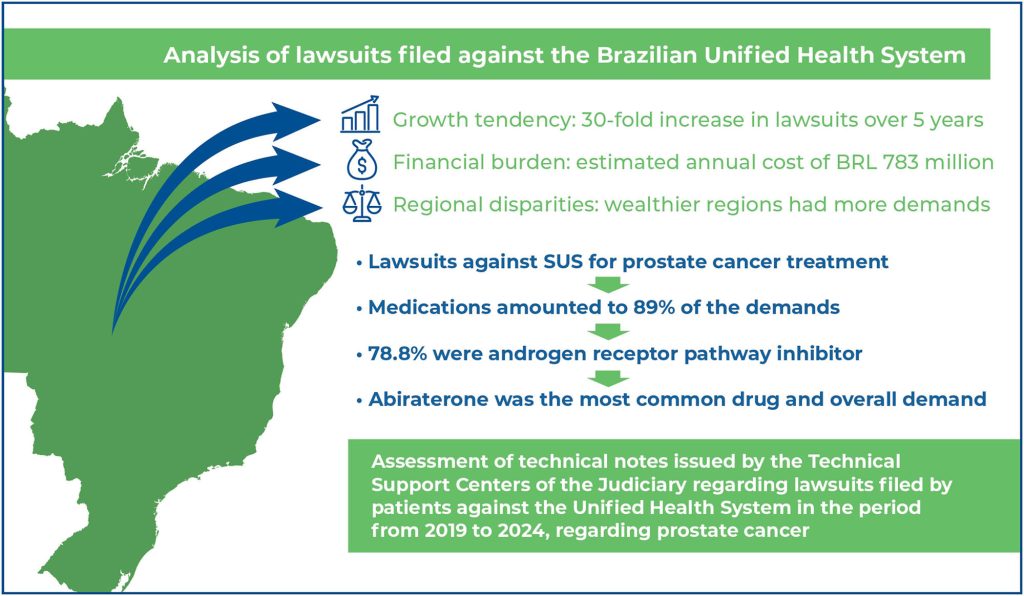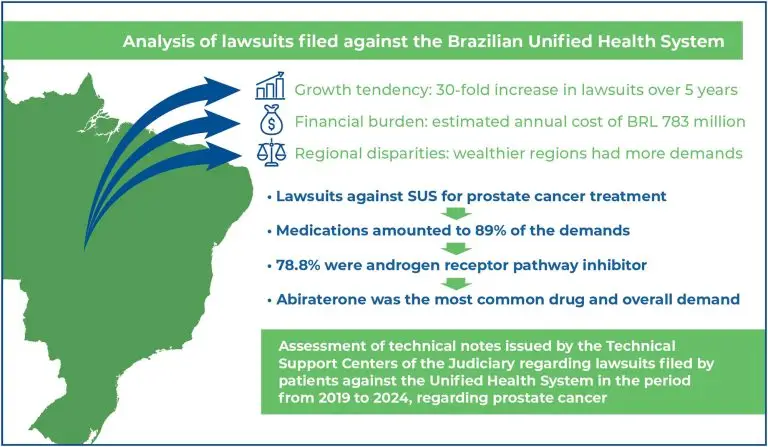einstein (São Paulo). 12/set/2025;23:eGS1301.
Judicial demands for prostate cancer treatment in Brazil: androgen receptor pathway inhibitors are an urgent public health problem
DOI: 10.31744/einstein_journal/2025GS1301
Highlights
■ A total of 89% of the 3,136 legal demands sought medication.
■ Androgen inhibitors amounted to 78.8% of all lawsuits, particularly abiraterone.
■ There is a growth tendency in judicialization, with a 30-fold increase over 4 years.
■ The estimated annual financial burden of judicialization on the Brazilian United Public Health System has reached BRL 783 million.
ABSTRACT
Objective:
Considering the difficulties of Brazil’s Public Health System in providing comprehensive care, the present article aimed to assess legal cases filed against the Brazilian Public Health System in pursuit of finer treatment for patients with prostate cancer. In doing so, this study aims to provide the intel necessary to support new public health policies, as well as to assess the financial impact on the Federation, thereby accounting for better outcomes in patient care.
Methods:
This cross-sectional study evaluated the technical notes issued by the Technical Support Centers of the Judiciary regarding lawsuits from patients against the Brazilian Public Health System from 2019 to 2024, concerning prostate cancer to better advise the formulation of public policies regarding oncologic care.
Results:
A total of 3,136 technical notes were issued. Lawsuits were intended to obtain either medication (88.6%), procedures (10.2%), or other healthcare products (1.2%). Most medications requested were Androgen Receptor Pathway Inhibitors in 2,470 cases, corresponding to approximately 88.9% of the demand for drugs and 78.8% of all treatment demands. Overall, abiraterone was the most requested intervention, accounting for 51.2% of the technical notes issued. As for the distribution of legal proceedings within Brazilian states, demands were more common in the Southern (42.2%), Northeastern (31.3%), Southeastern (14.1%), Central-western (11.5%), and Northern (0.86%) regions of Brazil. However, the Southeastern and Southern regions tend to pursue more expensive drugs.
Conclusion:
Therefore, there is a pressing need for strategic interventions to address the escalating healthcare litigation crisis in Brazil. Collaboration among government entities, the scientific community, the judiciary, and patient advocacy groups is essential for effective formulation.
[…]
Palavras-chave: Prostate neoplasms; Judicial role; Receptors, androgen; Public helath; Publoic policy; Cost analysis; Brazil
132



